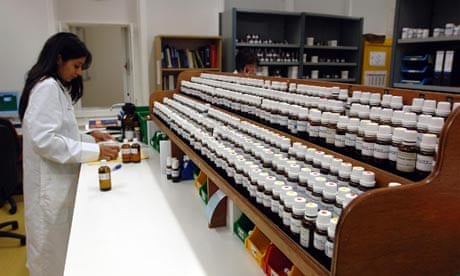To true believers, including Prince Charles, homeopathy is an age-old form of treatment for a wide range of ills. To most scientists, it is nothing more than water. Today the sniping between the devotees and the denialists became a head-on collision, as the House of Commons science and technology committee challenged the government to live by its evidence-based principles and withdraw all NHS funding from homeopathic treatment.
Nobody knows exactly how much the NHS spends on homeopathy. The Department of Health does not keep figures, although the health minister, Mike O'Brien, told the committee during an evidence-taking session that it was probably around or a little less than the figure of £12m over three years he had read in the Guardian.
However, said the committee's report, "it appears that these figures do not include maintenance and running costs of the homeopathic hospitals or the £20m spent on refurbishing the Royal London Homeopathic Hospital between 2002 and 2005."
Whatever the true figure, the money could be better spent, said the committee, accusing the Department of Health of failing to abide by the principle that its policies should be evidence-based. There is no robust evidence that homeopathy is effective, it said.
"The weight of evidence shows that homeopathy works no better than placebo," said chairman Phil Willis.
Homeopaths believe that like can cure like. A tiny dose of a substance linked to the cause of the malady is diluted until there is – chemically speaking – an undetectable amount of it remaining (homeopaths say the water retains the "memory" of the substance).
The concept "seems to us to be scientifically implausible, to put it mildly", said Willis.
The committee was highly critical of a scheme operated by the government's drug licensing body in the UK – the medicines and healthcare products regulatory authority (MHRA) – which allows homeopathic remedies to get a similar licence to drugs that have been through extensive randomised clinical trials. The National Rules scheme, introduced in 2006, requires only study reports, literature and homeopathic "provings" (evidence of long-term use by homeopaths).
The scheme is "deeply flawed", said Willis. Even the head of the MHRA, Professor Kent Woods, said in evidence to the committee: "I do not think there is anything there that one would take as robust evidence of an effect, over and above the placebo effect."
Just one product has so far been licensed under the scheme: Arnica Montana 30C. The report says the product's labelling misleads those who buy it, suggesting that in contains an active ingredient. Yet, said Willis, it "contains nothing but water".
The committee felt that the scheme operates "more in the interests of those who produce homeopathic 'medicines' rather than in support of public health", said Willis.
One member of the committee dissented from the report. Ian Stewart said he "would wish to be cautious about stating what homeopathy is or isn't". He was not convinced there was enough evidence either to prove or disprove an effect. "My view is that we should remain sceptical but not have closed minds," he said.
The Prince's Foundation for Integrated Health countered the MPs' attack by citing a peer-reviewed scientific study in the International Journal of Oncology which, it said, proved that homeopathic remedies were biologically active. Researchers from the University of Texas had shown that four ultra-diluted homeopathic remedies were capable of killing cancer cells in a test tube.
"This is one of a number of research trials that suggest positive results for homeopathy. It is puzzling that studies like this are ignored," said Dr Michael Dixon, medical director.
"But the most important issue is our patients. We should not abandon those we cannot help with conventional scientific medicine. If homeopathy is getting results for those patients, then of course we should continue to use it."
But Edzard Ernst, professor of complementary medicine at the Peninsula medical school in Exeter, said Dixon "should know that the study he cites is a test-tube experiment and not a research trial. It has no direct implications for healthcare. He also seems to think that prescribing homeopathic placebos to our patients might be a sensible strategy. This contradicts common sense and modern medical ethics.
"The foundation is a lobby group for unproven treatments," said Ernst.
The Department of Health said it would give the report "full consideration" and provide a response within two months.
"In the meantime, we would reiterate that we appreciate the strength of feeling both for and against the provision of homeopathy on the National Health Service," said a spokesman.
"Our view is that the local NHS and clinicians, rather than Whitehall, are best placed to make decisions on what treatment is appropriate for their patients – this includes complementary or alternative treatments such as homeopathy."

Comments (…)
Sign in or create your Guardian account to join the discussion